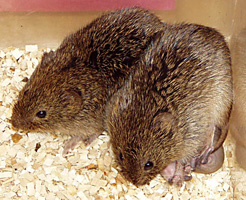OSU research on voles could offer insights for humans
Thursday, August 26, 2010


The research, funded by the Eunice Kennedy Schriver National Institute of Child Health
and Human Development of the National Institutes of Health, could contribute insights
for better understanding autism and human bonding, as well as causes of dysfunctions
in social attachments.
“The voles form long-term pairbonds and some of their behaviors appear very similar
to those that humans might call ‘love’ for both a mate and for offspring,” said Dr.
Alex Ophir, assistant professor, OSU Department of Zoology.
Ophir plans a series of studies to examine how hormones in the brain regulate social
affiliation, parental care (primarily from the father), territorial behavior, and
memory.
“For instance, we will specifically investigate the control of a particular hormone,
vasopressin, in brain areas known to influence pairbonding, and ask how the brain
functions to maintain monogamous bonds, and promote child care from fathers. We will
also ask what influence paternal care has on offspring brain and behavior development,”
said Ophir.
Ultimately, the research will provide a better understanding of what controls monogamy
and offspring care by fathers. It may also help understand the behavioral consequences
on developing young that have either good or bad fathers, according to Ophir.
